Michigan’s female wrestlers have blazed a trail, and now they deserve a state championship
Game changers

Audio By Carbonatix
[
{
"name": "GPT - Leaderboard - Inline - Content",
"component": "35519556",
"insertPoint": "5th",
"startingPoint": "3",
"requiredCountToDisplay": "3",
"maxInsertions": 100,
"adList": [
{
"adPreset": "LeaderboardInline"
}
]
}
]
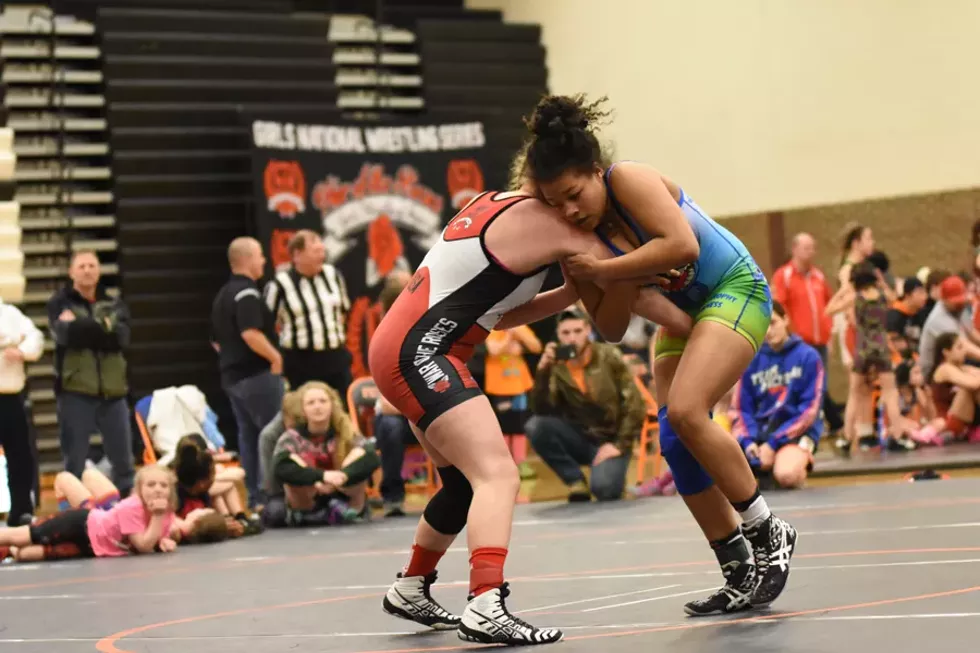
The school year hasn’t started yet on this August evening, and yet at 7 p.m. wrestlers start to trickle into the practice room at Fenton High School. It’s an open girls wrestling practice for school-age females interested in practicing with other girls, and it has drawn in about a dozen girls, aged 8 to 18, one even coming from 150 miles away.
What brings them here is the prospect of wrestling with other girls, as well as a few supportive guys there to fill out the weight classes. Plus the session’s instructors are some of the biggest supporters of female wrestling in Michigan. There’s high school coach Dominic Adams, whose son Tommy is there to support the girls too. Also here is Cliff Cushard, a barrel-chested man with a gentle disposition and a husky laugh who coaches girls’ wrestling at Adrian College. But front and center is Brent Harvey, 46, a coach and promoter who’s spent more than a decade focusing on coaching girls. Through his “War of the Roses” series, he’s given hundreds of girls the opportunity to challenge other females on the mat.
Soon, Top 40 music fills the air while the instructors shout, "Let's go!" — and the girls begin to warm up and jog around the room, then shuffle, lunge, and stutter-step, then get down, block, sprawl, and shoot forward in cartwheels, then in backward rolls. They pick up and carry one another around as they go. The energy in the room is getting deliberately souped up by all of these brisk, assertive movements, raising the girls' spirits high. It's all part of the session: As a sign on the wall reads, "Attitude determines your success."
After a brief cool-down, the girls start practicing, with advice and coaching from the three men. Some need help holding their stances as they move. Others gain tips on how to break holds.
"You can't let them hold you here," one coach warns. "You gotta make 'em pay."
And yet, such tough talk is rare. In fact, the practice session is utterly devoid of the sort of locker-room shaming associated, fairly or unfairly, with jockdom. The session is driven with a focus on energy, attitude, and positivity. When the group makes its final cheer, take away the mats and ankle bracelets and it might seem more like a theater group getting fired up for the opening night of a new play.
Maybe it's the influence of the girls, who spend much of the downtime socializing. Maybe it's the fact that the younger wrestlers — such as Olesya Mullins, 8 — have parents that accompany them, giving the practice a family-oriented feeling. Then again, it could be the shoptalk from the coaches, which adds to the professionalism.
Whatever it is, something is definitely changing in high school athletics, and girls breaking into sports where only boys had competed is one of the factors attracting fresh interest.
It's different for girls
If there's been a recent uptick of interest in the sport of wrestling, much of that is due to the ladies. Women's wrestling was added to the Olympics just a decade ago, but really captured attention last year, when a tearful Helen Maroulis won the first-ever U.S. gold medal in women's wrestling.
Her story also has a Michigan connection: As a high-schooler, Maroulis moved here from Maryland just for Marquette's U.S. Olympic Education Center at Northern Michigan University. In fact, Michigan has been a trailblazer when it comes to girls' wrestling: Females have been competing at the high school level — with the boys — and winning since the 1980s. These days, with no special considerations given by state officials, a couple manage to still qualify — for at least the lower weights — at the state tournament.
At least some of that success can be credited to Brent Harvey. Like Cushard and Adams, he's a former school wrestler who got his start in girls' wrestling watching his daughters compete. These days he lives in Whitmore Lake, where he's head coach at the high school, helping to restart the school's wrestling program after a 33-year hiatus. He runs their youth club as well, where he's got a few girls on his team. In addition to that, he runs Michigan Women's Wrestling, a girls-only U.S.A. wrestling club that feeds up into the national Olympics program. It keeps him traveling all over promoting his War of the Roses competitions. If anybody around the country wants him to come in and run a girls-only tournament, he does his best to make it happen.

Harvey's love affair with wrestling dates back to when he was 8 years old, and continued through high school and college. He says the one-on-one nature of the sport taught him some valuable lessons.
With wrestling, he says, "all the pressure was on me, I couldn't blame anyone else if I won or lost."
But when his two daughters were cheerleaders for their school's football team, he wanted something better for them. After moving to Brighton, his daughters joined the wrestling squad. Given that his day work is slow during the winter wrestling season, he started coaching in 2004, and he got a front-row seat watching how wrestling electrified his daughters. What had been a fatherly interest now became a guiding passion.
But he also got an up-close view of the challenges his daughters faced. They included a lack of acceptance from coaches, administrators, high school athletic directors, and the tremendous physical difference between girls wrestling girls and girls wrestling guys. But the worst was the emotional aspect of participating in a "boys' sport" and getting continually harassed.
"I've seen some horrendous things from one of the teams that my oldest daughter was on," he says. "She's a national, one of the top girls in the country, and getting opportunities to represent the country at tournaments. They got mistreated a lot."
One time, when the whole team was on a bus, one boy made a particularly vulgar sexist comment, causing the boys on the bus to burst into laughter.
"The school administration didn't do anything about it," Harvey says. "They didn't kick the kid off the team, they didn't suspend him, they didn't do nothing. The only thing that happened was the coach walked up to him and said, 'I better not hear anything like that again.' And that was the only thing that was said to the kid."
The situation created so much conflict, and the resolution was so unsatisfactory, that Harvey ended up taking his daughters to another school.
That same determination to provide a safe, accepting place for his kids drives his desire to help other girls navigate the wrestling world.
"I can't give it up because I've seen what it did for my kids," he says. "I tell people all the time, there's 1,000 guys doing what I do for men's wrestling. But very, very seldom do you see people putting the amount of energy that I put into the girls."
His work brought him into the orbit of the U.S. Girls Wrestling Association, a trailblazing Michigan organization headed by Kent Bailo in the 1990s that gave girls the chance to go head-to-head on the mat and put them on an Olympic track. When Bailo's operation folded about a decade ago, Harvey picked up where the USGWA left off, promoting his War of the Roses matches, incorporating it as a nonprofit in 2009. Soon, Harvey's phone was "ringing off the hook," he says, and things snowballed from there.
The first year, he says, he just ran one tournament. The next year he did three. The next year, he did 25. As the number of events mushroomed, Harvey scrambled to gain sponsors and fundraising to help kids pay for all of the traveling involved.
Luckily, Harvey isn't alone in his struggle to push female wrestling forward. State by state, the sport is becoming sanctioned by high school athletic associations, and some high-profile organizations are taking up advocacy. American women wrestlers now compete internationally with USA Wrestling, and groups like the National Wrestling Coaches Association are determined to see female involvement in the sport grow.
While Harvey says it's gratifying "to be able to get girls competing outside the country and making change," these new allies give him heart. But even he admits it's still a struggle.
"If I wanted something easy," Harvey says, "I'd just go back to coaching boys."
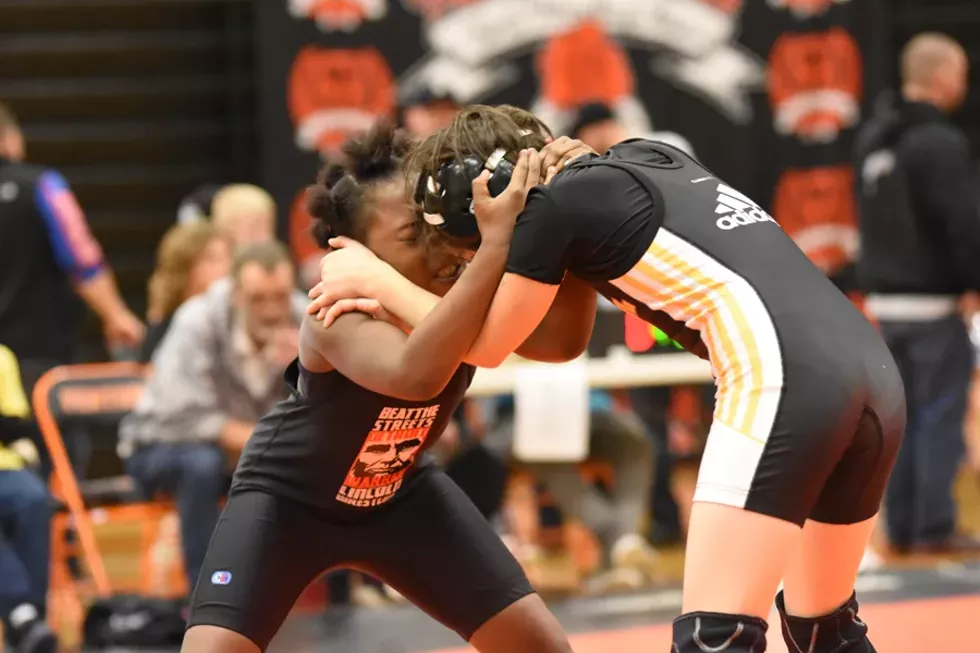
Conflict, tears, and love
Shouts and whistles echo off the walls of the massive gymnasium at Whitmore Lake High School, where an all-girls competition is taking place this February morning. Crowds fill the stands as wrestlers show what they've got on two mats. Several spectators crouch low near the action, watching for a pin during these fast-paced matches.
But most interesting of all are the parents who hover around the mat when their kids are mixing it up. They scream and yell, making a din that's altogether more alarming than their children's actual combat. One middle-aged woman erupts in bull roar after bull roar.
"That's the emotional part of wrestling that most sports don't have," Harvey says. "It's a hugely emotional thing when you're kid's out there. It's a fistfight without punches."
That said, the girls don't seem to take it nearly as personally. The handshake at the end of the match is sometimes accompanied by a hug. Yes, some girls will look miserable after losing and storm off the mat, tossing headgear to the side. But generally their competition is courtly and friendly.
"It's not uncommon to see two girls go as hard as they can on the mat, beat the snot out of each other, and then stand up and hug each other and then be hanging out at the side talking five minutes later," Cushard says with a laugh.
Perhaps it underscores the purity of conflict in wrestling: Everybody loses except the champ, and does it without the insulating factor of a team.
"Wrestling teaches us to be humble," Cushard says. "We know that most of us are going to lose on any given day. You can always take something away from the experience. If you can do that, you're going to be more mentally tough, you're going to become a better wrestler over time, and you're going to become a stronger-minded individual for the rest of your life."
The outcomes aren't always pretty. For instance, one girl seems to land on her foot badly, perhaps spraining her ankle, and can't go on. Tears roll down her face from the pain, leaving her opponent visibly upset. Her parents come in and apply ice and try to comfort her. When they finally pick her up and take her off the mat, the audience applauds warmly in an outpouring of support. In fact, throughout the day, the audience gives more applause to the courageous losers than any of the winners.
When one girl loses a hard-fought match and then retreats behind a wall to cry, soon her brother comes over to comfort her. Before long, her family has encircled her. Her mother kisses her on the forehead. She's surrounded by the healing power of her family's love and reassurance.
"That's exactly what we're looking for," Cushard says. "These girls' tournaments, the War of the Roses tournaments, tend to be like that. ... The family should be the pressure release system, not put more pressure on."

The girl who wanted to make the boys cry
Most people would think of boys wrestling girls as anything but a fair fight. But in the beginning, at least, it often is. When girls begin wrestling at a young age, they're generally just as strong as their male opponents. Girls are often more flexible than the boys, which can even give them an edge.
It would be difficult to find a better example of this type of youth wrestler than Olesya "O" Mullins, the same girl who was at the Fenton practice session last summer.
The Mount Pleasant 8-year-old was inspired to get into wrestling by her older brothers, and in three years she has racked up a shelf full of trophies — most of them first place — in her bedroom, as well as a belt that dwarfs her. She's on three different wrestling teams, has won several matches, and placed in national tournaments. The sport has taken her to Indiana, Colorado, New York, Oklahoma, and Nevada. Harvey estimates Olesya has traveled about 7,000 miles in just the last year.
Her mother, Suzanne Mullins, says Olesya is a classic tomboy, drawn to tough stuff. "She plays baseball, but didn't want to play flag football; she wants to play tackle," she says. "She's like, 'That's a waste of my time!'"
In fact, Suzanne tells us point-blank: "She got into wrestling to make the boys cry."
The impetus was one boy in particular whom she hoped to beat on the mat. She got her wish.
Olesya's grandfather Gregory "Boots" Pattenaude, says, "After five times of him trying to beat her, she hugged him and said, 'I'm sorry I made you cry.' She said, 'But you know what? You should get out of wrestling and go take baseball or something, because they don't like crybabies in wrestling.'"
"Believe it or not," Suzanne says with a laugh, "there's not a week that goes by that she doesn't at least make two boys cry."
Other boys see her as a formidable challenge. Suzanne mentions a 49-pound boy wrestler who can't pin her. The boy has made it a personal goal to pin her by the end of the year. Suzanne says the boy laments to his mother, "I pin these boys, but I can't get her pinned."
Suzanne admits she was a bit concerned at the outset, "because I've seen they get rough. But she doesn't seem to care. ... I didn't honestly think she'd go past a year, but this is her third year, and she doesn't want to stop. And in three years of wrestling, she's probably only cried twice herself."
Olesya keeps in shape with a demanding practice regimen, two hours four days a week, sometimes five, doing three-hour grinds on the weekend, and keeping up with kids years older than her. In fact, 48-pound Olesya routinely beats girls weighing almost 60 pounds.
You need only encounter Olesya for a minute or two to see she's a strong-minded, confident young person. "She's very friendly, very talkative," Suzanne says. "She's got a fourth-grade reading level. She's doing really well. She can walk up to a stranger and just chitchat."
In fact, the Mullins family is already discussing a college scholarship. Many of the colleges that have wrestling don't have enough girls to fill their spots, so they offer scholarships, some of them for all four years. Citing her daughter's USA ranking, Suzanne says, "She has a 91 percent chance of making it to the Olympics, if she keeps going. And that's good."
It's a hope the family takes seriously. Of course, there are many qualifiers. Olesya will have to keep wrestling all the way through high school if she hopes to gain something like a full ride. And she's still only in third grade.
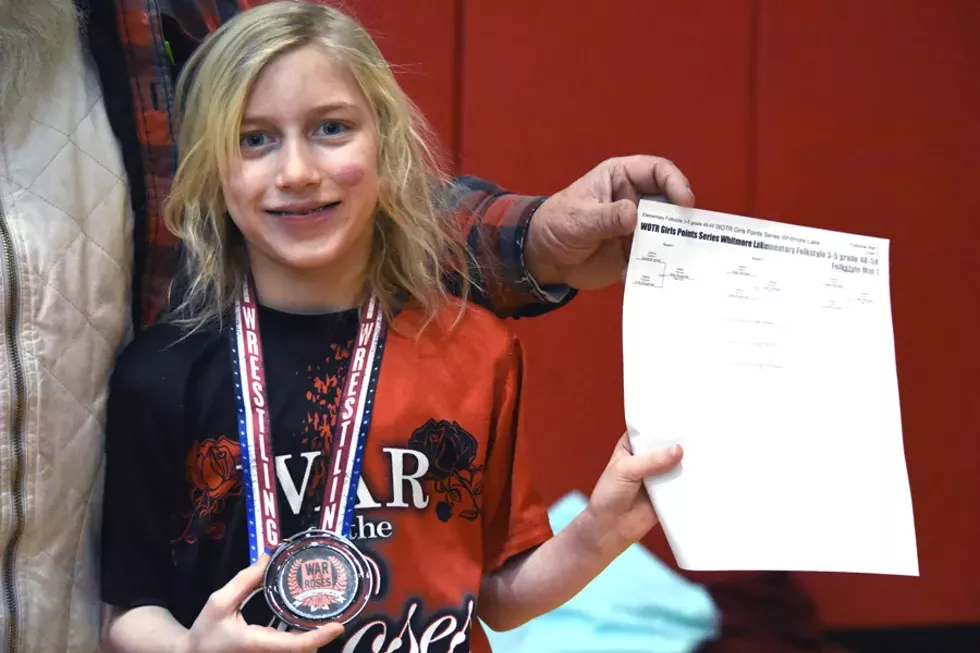
Creating an endgame
While Olesya illustrates how young female wrestlers can compete with boys and win, the balance definitely shifts with age. That shift is one of the major challenges keeping a young, successful female wrestler from staying with the sport until her high school graduation.
"They might even have the upper hand as a youth wrestler," Harvey says. "But as soon as they get to the age where the boys are hitting puberty, it just goes in the opposite direction for them. They really struggle. And that's where we're losing most of the girls."
"Right or wrong, the girls struggle and have a much harder path to get through," Cushard says. "Imagine how hard it is on a 14-year-old girl freshman who steps into a wrestling room against a potentially 18-year-old or 19-year-old senior, with a much more developed body type, a mustache, maybe tattoos. This is a young man now. Here's an adolescent girl against a young man. Most of the girls seem to drop out between 8th and 9th grade. And another big batch drops out after 10th grade."
Harvey and Cushard don't have a problem with girls wrestling boys per se. Their main problem is that girls compete for the same reason the boys do: to win. In the absence of a girls-only tournament to train for, where they can actually win, most girls would rather do something else, especially if they don't feel welcome.
"Whether they stay through the whole season has to do with the fact that they don't have any endgame," Harvey says. "We haven't had a Michigan girl win a state championship with the boys ever. A few of them have won one match. But we've had like 50 girls from Michigan make the world team now. All we need is the opportunity for them to compete against other women at a state championship tournament that the high school association sanctions, and then all of a sudden the numbers will start doubling every few years just like they have in California, Washington, Oregon, Texas, and Hawaii. Once those states sanctioned it, the numbers just grew like crazy. Because there's a trophy."
While Michigan was a pioneer when it comes to girls’ wrestling, other states are passing Michigan by.
tweet this
According to the National Wrestling Coaches Association, since 1994, the number of U.S. girls who wrestle in high school has ballooned from 804 to 13,900. Six states — California, Hawaii, Oregon, Tennessee, Texas, and Washington — now host official scholastic state all-girls championships. All-girls tournaments are also the norm in the territory of Guam, the city of New York, and perhaps soon the District of Columbia.
Not all of those places arrived at sanctioned girls' tournaments by the same path. In some cases, they resulted from a reactionary streak with decidedly ironic outcomes. For instance, in Texas, a state law was passed prohibiting girls from wrestling boys. It proved a boon for girls-only wrestling.
"Now they're the second-largest state in the country for girls' wrestling," Cushard says. Cushard suggests Michigan pursue a "stepping stone" approach, something like California's example, where, girls wrestle with the boys until they reach district and regional competitions that can support girls-only tournaments.
Whatever the approach, one thing is clear: While Michigan was a pioneer when it comes to girls' wrestling, other states are passing Michigan by.
"You know, Texas has 3,700 girls wrestling now, and California has about 3,000 girls wrestling there," Harvey says. "Michigan has around 250 girls that finish the season. They start around 500 girls at the weigh-in at the beginning of the year, but about half of them don't stick with it for whatever reason. And a lot of it is because they don't have an endgame: There's no high school girls' division for them to win a state championship. So if they realize they don't have an opportunity to represent their school in a competition where they know they can have some kind of a success, a lot of them will drop out."
For Harvey, as a coach, promoter, and father of female wrestlers, it's a deeply personal issue.
"My kids went all the way through the sport since they were 8 or 9 years old all the way through high school. And it should have been sanctioned 10 years ago, and there's no reason why it's not. Tennessee sanctioned it, and they only had 100 girls in the sport in their state. So, Michigan's got two-and-a-half times that many, why aren't they sanctioning it? ... If they would have just added a girls division to the high school state tournament 10 years ago, I think we'd already be at 2,500 or 3,000."
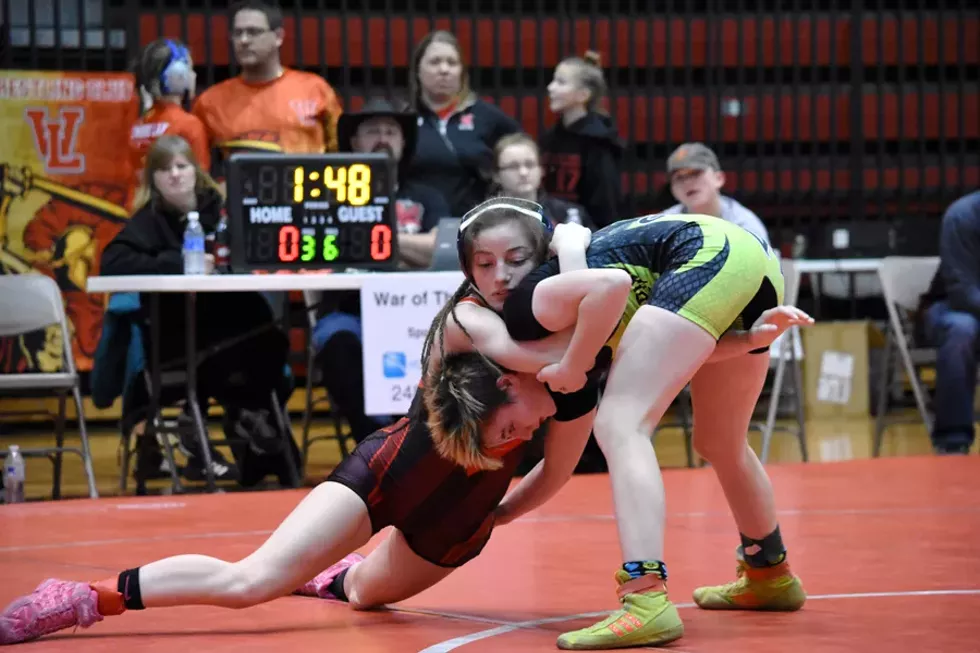
'Every state is different'
If Brent Harvey sounds frustrated, it's because he has spent a decade trying to persuade the Michigan High School Athletic Association to add a girls' state tournament. So far, those efforts have been fruitless.
"They gave me a different reason almost every year," he says.
Both Cushard and Harvey say they understand it's not easy for a statewide organization to embrace change, and Harvey speculates that the MHSAA may still be smarting from a 2001 gender-equity lawsuit charging that the association "discriminated against female athletes." According to an MHSAA spokesperson, the lawsuit forced the association to add four sports.
"By the time they had paid the attorney's fees and the people who took them to court, it almost put them under," Harvey says. "So I understand that they don't want to get into that situation again, but by the same token, I just wish they'd put in enough energy to get it rolling."
"They've got legitimate concerns," Cushard says. "For most of the schools, gym space for practice times is at a premium during winter months. The gyms are full from the end of school until 9 at night, and adding another team into that mix would be difficult. But these are all details in my mind."
The MHSAA's new director of wrestling, Dan Hutcheson, says he's just getting his bearings six months into his new job. But MHSAA spokesperson John Johnson says the association promotes "inclusion across the board," but simply can't decide to add a girls' tournament. He says they need to see high schools put together scores of all-girls teams before they can consider adding a state tournament. Other states may be able to add a girls' wrestling tournament, he says, but "every state is different."
"If the schools are going to promote it, we'll be right there in lock-step with them," Johnson says. "If people have a beef with the MHSAA, their beef ought to be with their local school if it isn't sponsoring a girls' wrestling team."
Harvey says leaving the matter up to the schools "will make it that much harder and longer until they add it as an official sport."
Cushard says that stance is news to him.
"As far as I know," Cushard says, "that has never been clearly stated anywhere. How in the world would a school set up a team? Would they compete against the boys during the normal season? Or do they mean girls' clubs that would compete only against other girls' clubs? Either way it is a very high bar to clear when the obvious answer is being done by several other states already. Allow the hundreds of girls wrestling on boys' teams to have their own state championship."
Johnson reiterates that "every state is different," adding, "You're talking about something that would quite possibly require us to change our constitution."
If the MHSAA sounds a bit defensive, it's likely due to a growing chorus of voices demanding leadership on the issue. In addition to the advocacy of USA Wrestling and the National Wrestling Coaches Association, a new national organization has targeted Michigan for change, specifically because of its long history of females competing in the sport.
That group is called Wrestle Like a Girl, and it's led by two-time world bronze medalist and combat veteran Sally Roberts, a self-described "door-kicker" for female wrestling. Roberts says Michigan is one of several states it's focusing its efforts on.
"And it's really important," Roberts says, "because there are so many girls in the state of Michigan that wrestle. ... Michigan was one of the pioneering states that really embodied female wrestling early on, and along the way, I'm not sure what exactly happened, policy or politics got in the way and really started to hamper change, and it went from an advanced movement to stagnation. That's where we come in as an outside voice representing all of the girls in the state of Michigan on their behalf to push and spur that movement on. ... [Because] when we don't have a state championship, we lose some of those girls as they fall through the cracks."
"At the end of the day," Roberts adds, "the girls in the state deserve better, because they were some of the pioneers pushing the agenda, and it stalled. It's unfair to the athletes, it's unfair to the coaches, and it's unfair to the movement. That's why we've championed Michigan. It could be one of the first 10 states to sanction female wrestling: It could emerge as one of the leaders, and remain one of the leaders, because there are so many girls."
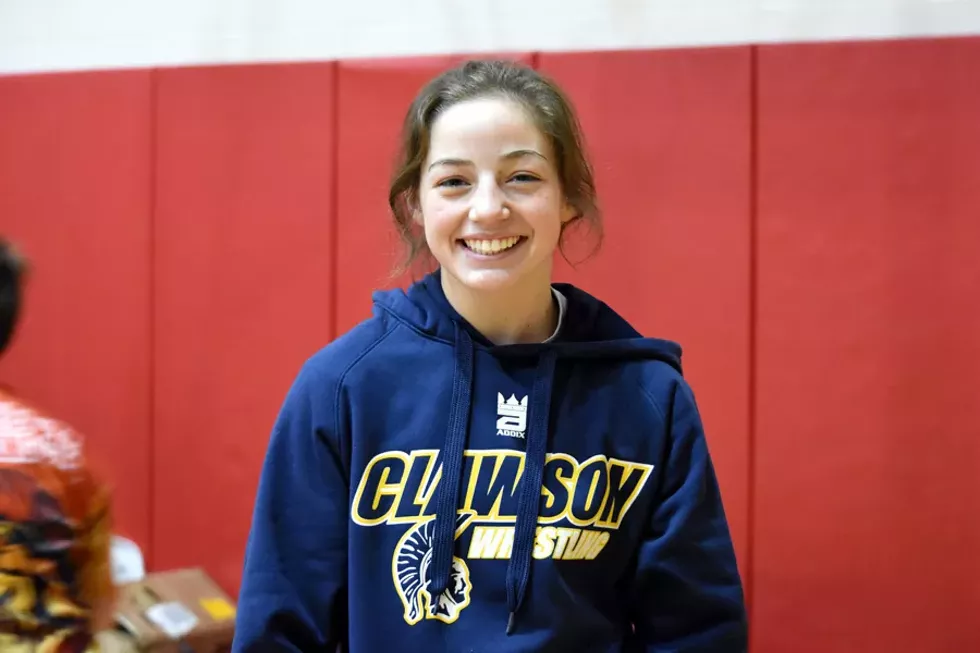
An imperfect process
For Harvey, a state tournament is an inevitability, even if it's one that's past due. But, for better or for worse, the system that now prevails in Michigan produces a very special kind of female athlete: One who has progressed from the oddball girl and persevered through neglect, disdain, and finally won over their coach, their teammates, and their school.
This kind of wrestler is the one who's "going out at tournaments and wrestling almost entirely boys," Cushard says. "And all those boys are coming on the mat being told by their dads or their moms and their coaches, 'You'd better not lose to that girl.' So she's getting the best possible contest out of that guy.
"So the girl who pushes through all of that, and ends up as a senior, fairly often ends up being the captain of her wrestling team, because she's proven to the coach that she can handle it. She might not be the most successful, she might not have the most wins, but she's going to prove to the coach, and her teammates hopefully, that she's tough and she can deal with it."
"The girls that make it through this imperfect process we're talking about, they have to have so much grit and tenacity and fight," Roberts says. "At the end of the day that builds a fantastic human being — because they can walk up and shake anyone's hand and look anyone in the eye because they know they can go through some of the hardest challenges — a girl wrestling a boy in a combat sport. And knowing they may not always win but they're always going to put their toe on the line and give 100 percent of what they have."
It sounds like a tailor-made definition for Clawson High School senior Katlyn Pizzo.
Katlyn — or "Little P" as she's sometimes called — is one of the two girls who made it through to the state tournament this year. She's racked up a pile of trophies and traveled further than Marco Polo doing it. She went to USA Wrestling Junior Olympics in Brazil, placed second in Peru at the Pan Am Games, second at Cadet World Team Trials, third at Junior World Team Trials, second in Canada at the York University Tournament, and first in national folk-style wrestling in Oklahoma.
‘They have to have so much grit and tenacity and fight. At the end of the day that builds a fantastic human being.’
tweet this
Sitting near the mat at Whitmore Lake, Katlyn's mom, Lisa Pizzo, tells us that when Katlyn started in seventh grade on the boys' team, "It was a little weird for her boys' team in the beginning."
As Katlyn tells it, one boy made fun of this young girl with painted nails who wanted to wrestle with the boys. That guy is long gone, and Katlyn is now captain of her team.
"She's been on that boys' team since seventh grade," Lisa says, "and they all get it. ... The boys are used to wrestling with her in our wrestling room, and they don't treat her any differently than they treat anybody else in there."
Outside the team, however, the high school wrestling scene is less welcoming.
"It seems like refs don't call a pin for her as quickly as they will for a boy," Lisa says. "There's still tons of people out there who don't think girls should be wrestling on the boys' team. And there's boys who will avoid her because they don't want to wrestle a girl."
That's something that Katlyn bristles at. "The worst thing is the ones who say it's religious and they're doing it out of respect," Katlyn says. "But I chose to do this sport. If you respect me, you're going to treat me just like you'd treat anybody else. That's the worst part because, like, where do you get that that's respectful?"
Katlyn's story shows why it's important girls get a fair shake in high school sports. You get the sense that wrestling was how she won her obvious confidence, even swagger, from going toe-to-toe and giving her all. Equality in the wrestling room prepares girls for equality later on.
"We like to say that it teaches you about life," Cushard says. "You learn how to have grit. It teaches you things like how to put your head down and just grind and get the work done, even when it isn't fun. We like to think that sports help kids learn how to be good adults and have successful lives. And I think that's true."
Or as female wrestling advocate Roberts says, "The sport of wrestling increases social mobility. Because it's a combat sport, it tends to pull from girls who have this tenacity, who often come from homes or communities that lack resources, and through the sport and all the character development it brings — goal-setting, planning, resiliency — that encourages them to continue on through high school and to go on to college."
Roberts continues: "That's the girl who's going to be able to become an entrepreneur, and get into Harvard, and meet all those deadlines, and beat all those goals, because they already know what that mental and physical toughness is. Anyone that is in the sport long enough comes to love it. And fostering that love, in the face of all those challenges and hardships, they can take on anything in this world."
"When I started," Katlyn says, "I didn't want to do the school team because it was middle school and I was scared what other people would think. And now I don't really care what people think about anything."
Except for mom, of course.
"She's definitely more confident in everything that she does," Lisa says. "It sets her up for her schoolwork, as far as making sure that she gets good grades and stays on top of that. And it's the whole time-management thing between schoolwork and training and having some downtime."
"They have a lot to show for themselves, being the only girls out there. It's a lot on their shoulders but they handle it well. It adds character. And they have a lot of it. And a lot of sass to go with that, right, Katlyn?"
Her daughter beams and shouts, "Yeah!"





